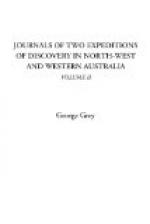Another mile and a half in a south by east direction brought us to a low range to the south of this river, which I named the Arrowsmith River after Mr. John Arrowsmith, the distinguished geographer. From this range we had a fine view of the rich valleys drained by this important stream.
Mount Horner.
These valleys ran nearly north and south between the interior range and the sandy limestone range parallel to the coast on which we now were; but the river must also, of course, from its magnitude, penetrate the interior range, which was only distant about sixteen miles from us. A very remarkable peak in the latter, which bore east-north-east from this point, I named Mount Horner, after my friend Leonard Horner, Esquire.
It appears from the report of the party who came along the coast that this river loses itself in a large lake, between which and the sea a great bar of dry sand intervenes in the dry season; there is however a very fair proportion of good country in the neighbourhood of the Arrowsmith.
In the course of the evening we travelled six and a half miles further in a south-south-east direction, over barren, sandy, scrubby plains, which extended on all sides as far as the eye could see, and even the interior range appeared to be perfectly bare. Towards nightfall we were all quite worn out from the difficulty we had experienced in walking through the prickly scrub, yet I could see no place that afforded sufficient wood to enable us to make a fire and, as most of us had no covering with us, and the nights were intensely cold, we had every prospect of passing a most wretched one; but at length I spied two clumps of Banksia trees, the nearest of which we just reached as it became quite dark. The other clump was about a quarter of a mile to the eastward of us, at which I soon distinguished native fires; as the men were however much exhausted I thought it better not to mention this circumstance to them, and Kaiber and myself, who always slept at a little fire alone, kept a good look out during the night.
This evening we found the Bohn or Boh-rne, a native esculent root, and it is the most northern point at which I have met with it.*
(Footnote. A small red root somewhat resembling in flavour a mild onion.)
April 12.
Before dawn this morning our native neighbours, who doubtless were not pleased at our sleeping so near them, began to cooee to each other, which is their usual signal for collecting their forces; and, as our safety depended upon none of the party being incapacitated by a wound or other cause from proceeding with the utmost rapidity, I at once roused the men and we resumed our way.
Continue our route.
In the course of the day we made a march of twenty-five miles in a south-south-east direction, the whole of this distance being across elevated undulating sandy plains, covered with a thick prickly scrub, about two and a half feet high; these plains were however occasionally studded with a few Banksia trees, but anything more dark, cheerless, and barren than their general appearance can scarcely be conceived.




